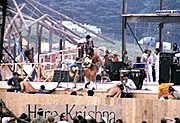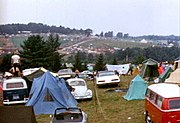
Woodstock
Woodstock Music and Art Fair, commonly referred to as Woodstock, was a music festival held from August 15 to 18, 1969, on Max Yasgur's dairy farm in Bethel, New York,[3][4] 40 miles (65 km) southwest of the town of Woodstock. Billed as "an Aquarian Exposition: 3 Days of Peace & Music" and alternatively referred to as the Woodstock Rock Festival, it attracted more than 460,000 attendees.[3][5][6][7] Thirty-two acts performed outdoors despite overcast and sporadic rain.[8] It was one of the largest music festivals in history and became synonymous with the counterculture of the 1960s.[9][10][11][12]
This article is about the 1969 music and art festival. For other uses, see Woodstock (disambiguation).Woodstock
August 15–17, 1969 (scheduled)
August 15–18, 1969 (actual)
1969
Artie Kornfeld
Michael Lang
John P. Roberts
Joel Rosenman
Woodstock Ventures
460,000 to 500,000 people (estimate)
The festival has become widely regarded as a pivotal moment in popular music history, as well as a defining event for the silent and baby boomer generations.[13][14] The event's significance was reinforced by a 1970 documentary film,[15] an accompanying soundtrack album, and a song written by Joni Mitchell that became a major hit for both Crosby, Stills, Nash & Young and Matthews Southern Comfort. Musical events bearing the Woodstock name were planned for anniversaries, including the tenth, twentieth, twenty-fifth, thirtieth, fortieth, and fiftieth. In 2004, Rolling Stone magazine listed it as number 19 of the 50 Moments That Changed the History of Rock and Roll.[16] In 2017, the festival site became listed on the National Register of Historic Places.[17]
In popular culture[edit]
As one of the biggest music festivals of all time and a cultural touchstone for the late 1960s, Woodstock has been referenced in many different ways in popular culture. The phrase "the Woodstock generation" became part of the common lexicon.[148] Tributes and parodies of the festival began almost as soon as the festival concluded. Cartoonist Charles Schulz named his recurring Peanuts bird character – which began appearing in 1966 but was still unnamed – Woodstock in tribute to the festival (see GoComics archive – 1970JUN22).[149] In April 1970, Mad magazine published a poem by Frank Jacobs and illustrated by Sergio Aragonés titled "I Remember, I Remember The Wondrous Woodstock Music Fair" that parodies the traffic jams and the challenges of getting close enough to actually hear the music.[150] Keith Robertson's 1970 children's book Henry Reed's Big Show has the title character attempting to emulate the success of the festival by mounting his own concert at his uncle's farm.
In 1973, the stage show National Lampoon's Lemmings portrayed the "Woodchuck" festival, featuring parodies of many Woodstock performers.[151]
Time magazine named "The Who at Woodstock – 1969" to the magazine's "Top 10 Music-Festival Moments" list on March 18, 2010.[152]
In 2005, Argentine writer Edgar Brau published Woodstock, a long poem commemorating the festival. An English translation of the poem was published in January 2007 by Words Without Borders.[153]
In 2017, the singer Lana Del Rey released a song, "Coachella – Woodstock in My Mind," in order to show her worries about the tensions between North Korea and the United States while she was at Coachella, expressing nostalgia by using the Woodstock festival as a symbol of peace.[154]
In 2017, Portland rock band Portugal. The Man released album Woodstock, inspired by the lead singer John Gourley's conversation with his dad about the Woodstock festival ticket stub.[155]
In August 2019, the United States Postal Service released a Forever stamp commemorating Woodstock's 50th anniversary.[156] The stamp was designed by Antonio Alcalá, Art Director of the USPS and was first issued at the Metropolitan Museum of Art in New York City on August 8, 2019.[157] The museum was hosting Play it Loud, an exhibit co-organized with the Rock & Roll Hall of Fame consisting of vintage rock and roll instruments, posters, and costumes.[158] Attending the ceremony were Woodstock producers Michael Lang and Joel Rosenman. The ceremony began with a "stirring" electric guitar performance of The Star Spangled Banner by "Captain" Kirk Douglas of the Roots—"reminiscent" of Jimi Hendrix's performance at the original festival.[159]
In 2023, a South Korean organiser officially purchased Woodstock's license and tried to hold a festival in Pocheon, but there was a lot of controversy due to insufficient preparation in the process of preparing for the festival, and it was eventually cancelled.[160][161][162]






